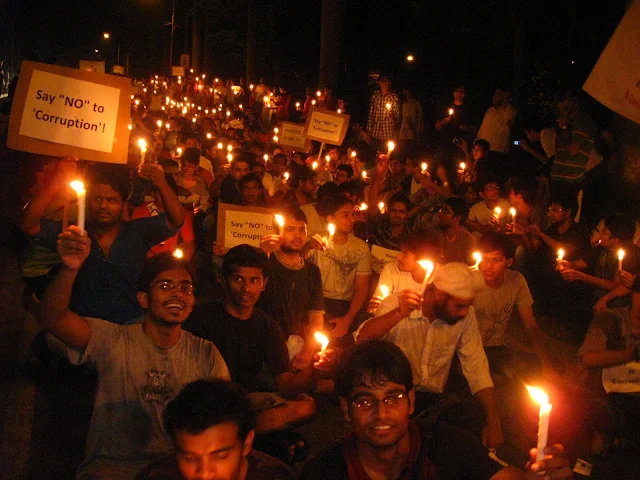By Harasankar Adhikari*
Is democracy meant for all the people, or are democratic rights confined to only the political rulers? A search for answer to this question suggests that democratic rights of the people are restricted to the right to vote, not beyond. So, in the political party-based Indian democracy, which is the world's largest democracy, the issue is: Where is people's independent and free thinking as well as their decision-making?
The fact is, the political party leaders and their active followers and supporters have the extreme right to do whatever it is for their own benefit, because they are considered heavyweights in democracy. They are the lawmakers and policymakers. What laws they make are for the common masses, but the common masses are mostly kept outside the application of the laws.
It is in this framework that one needs to examine corruption and its relationship with democracy. According to Santhanam Committee of the Government of India, 1962, "Corruption is the improper or selfish exercise of power and influence attached to public office or the special position one occupies in public office or the special position one occupies in public life”.
"In India, corruption remains endemic, prevailing at all levels of governance and affecting sectors including but not limited to public services, procurement, police, and the judiciary., adds Kaunain Rahaman in "Overview of corruption and anti-corruption developments in India" (2022).
Corruption has become an important and attractive pillar of Indian political rule based democracy. It has even been officialized unofficially. Leaders and their followers are actively involved in corruption, and they use the political banner to create wealth.
Is democracy meant for all the people, or are democratic rights confined to only the political rulers? A search for answer to this question suggests that democratic rights of the people are restricted to the right to vote, not beyond. So, in the political party-based Indian democracy, which is the world's largest democracy, the issue is: Where is people's independent and free thinking as well as their decision-making?
The fact is, the political party leaders and their active followers and supporters have the extreme right to do whatever it is for their own benefit, because they are considered heavyweights in democracy. They are the lawmakers and policymakers. What laws they make are for the common masses, but the common masses are mostly kept outside the application of the laws.
It is in this framework that one needs to examine corruption and its relationship with democracy. According to Santhanam Committee of the Government of India, 1962, "Corruption is the improper or selfish exercise of power and influence attached to public office or the special position one occupies in public office or the special position one occupies in public life”.
"In India, corruption remains endemic, prevailing at all levels of governance and affecting sectors including but not limited to public services, procurement, police, and the judiciary., adds Kaunain Rahaman in "Overview of corruption and anti-corruption developments in India" (2022).
Corruption has become an important and attractive pillar of Indian political rule based democracy. It has even been officialized unofficially. Leaders and their followers are actively involved in corruption, and they use the political banner to create wealth.
Take for instance West Bengal, where corruption is everywhere in each dole-centric government scheme. During a decade of TMC rule in West Bengal, the ruling party leaders have committed themselves to corrupt practices. It helps the politicians' capability to ensure better future to their followers and supporters.
The party’s top leadership facilitates the socio-emotional development of its followers and supporters for corruption. It is an easy process for earning a handsome living. The top leadership also guides them with bureaucratic help and support. Ultimately, everyone in this party has shaped their personality with the help of corruption.
The maximum benefits are enjoyed by the party’s top leadership because the party workers are collection agents and share a handsome percentage of the collection. Party workers work as vote machines. They do not think about the people who vote for them.
This is how corruption has become an important pillar of political democracy.
Everyone should follow the advice of Swami Vivekananda to rectify ourselves: “Come up, young ones of the bird of paradise, before your feet touch the cesspool of corruption.”
The maximum benefits are enjoyed by the party’s top leadership because the party workers are collection agents and share a handsome percentage of the collection. Party workers work as vote machines. They do not think about the people who vote for them.
This is how corruption has become an important pillar of political democracy.
Everyone should follow the advice of Swami Vivekananda to rectify ourselves: “Come up, young ones of the bird of paradise, before your feet touch the cesspool of corruption.”


Comments